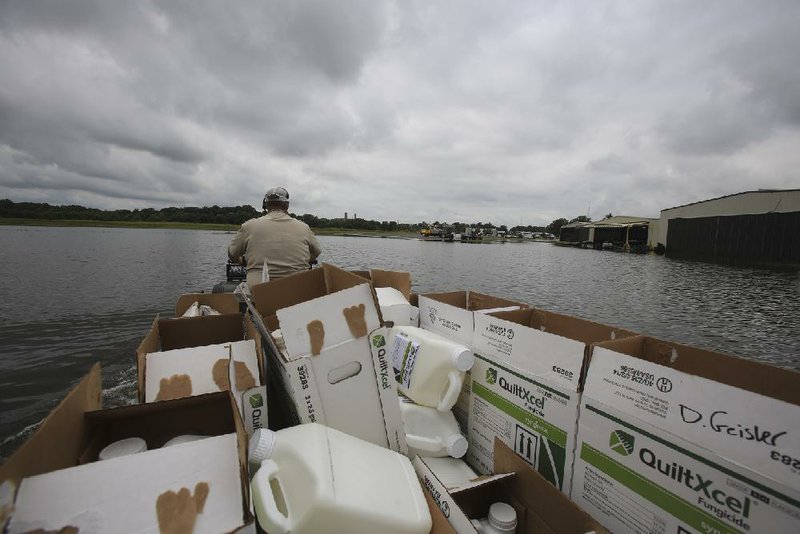BRINKLEY -- Floodwaters covered thousands of acres of cropland and were still invading homes in eastern Arkansas on Wednesday, more than a week after heavy rains inundated the area June 29.
More than a half-foot of rain fell in some areas, according to the National Weather Service in North Little Rock, and much of the water has been slow to recede because the Cache and and White rivers are running high.
A flood warning remains in effect for the Cache River near Patterson, affecting Jackson and Woodruff counties, according to the weather service. The river was nearly a foot above its 8-foot flood stage on Wednesday, but it is expected to fall below flood levels by this afternoon, weather officials said.
Gov. Mike Beebe has asked the federal government to declare 10 Arkansas counties -- Cross, Independence, Jackson, Lee, Lonoke, Monroe, Prairie, St. Francis, White and Woodruff -- disaster areas because of the flooding.
Beebe toured hard-hit Brinkley on Tuesday to reassure residents and farmers that monetary help is on the way. About 20 homes in the city's Snow Addition subdivision behind Frank Federer Memorial Airport remain flooded.
"These folks are hurting," Beebe said Tuesday, according to a spokesman from his office. "Farming is a livelihood for them. When they see something like this it devastates their whole year."
In a July 3 letter to U.S. Department of Agriculture Secretary Tom Vilsack, Beebe said the 10 counties affected by flooding had suffered "significant damage and losses to crops and pastures."
On Wednesday, water blocked the way to many houses in the Snow Addition, and several inches of water remained inside some residences. As much as a foot of water also covered a good portion of the Brinkley airport and its recently resurfaced tarmac.
Damage totals in Brinkley have not been tallied, but officials said they expect it to be significant.
P.K. Norman, director of the Monroe County Emergency Management Office, said residents of the Snow Addition are "unfortunately used to being displaced because of flooding," but he added that "this is some of the worst flooding we have seen."
The Snow Addition sits in a low-lying area with poor drainage, and the city and county have for years "been trying to figure out how to fix the issue," Norman said.
"The Piney Creek drainage has serious issues that we have tried to resolve over the years, but it's a complicated issue, and there is a lot to it."
An American Red Cross shelter set up at First Baptist Church in Brinkley had a few visitors Tuesday, but there were no overnight guests, said Brigette Williams, a spokesman for the Red Cross in Arkansas.
"If we don't have any overnight visitors [Wednesday night], we will close the shelter Thursday," Williams said. "We only saw a few people come by. Most were not interested in a shelter, but we just wanted to make one available. Most people are working to get the water out of their homes and staying with friends or relatives."
Assessments of damage to eastern Arkansas croplands are underway, and a dollar amount on the losses has not been determined, said Mary Hightower, director of communications for the University of Arkansas' Agriculture Division.
"We are taking a wait-and-see approach," Hightower said. "It's a holding pattern right now, waiting for farmers to see just how much damage was done. We estimate around 75,000 acres were affected by significant flooding, mostly soybeans."
Jeremy Ross, a soybean specialist with the Agriculture Division, said soybean farmers have been hit hardest, followed by cotton farmers.
"It's going to be a few days before we really know the extent of the damage," Ross said. "For some farmers, it's going to be too late to try and replant because water is still standing on their fields."
In Brinkley, Eddie Henry, who operates a flying service at Frank Federer Memorial Airport, spent the afternoon clearing water out of his hangar offices and counting his blessings.
His hangar was the only one at the airport without standing water Wednesday. Henry said he had never seen water so high in the decades he has operated his business.
"My hangar is one of the highest out here, and we just got the water out of it last night," he said. "We still have a lot of damage, though. Who knows how much at this point? Our built-in cabinets, paneling doors -- everything is shot. We are talking about lots of money here."
State Desk on 07/10/2014
